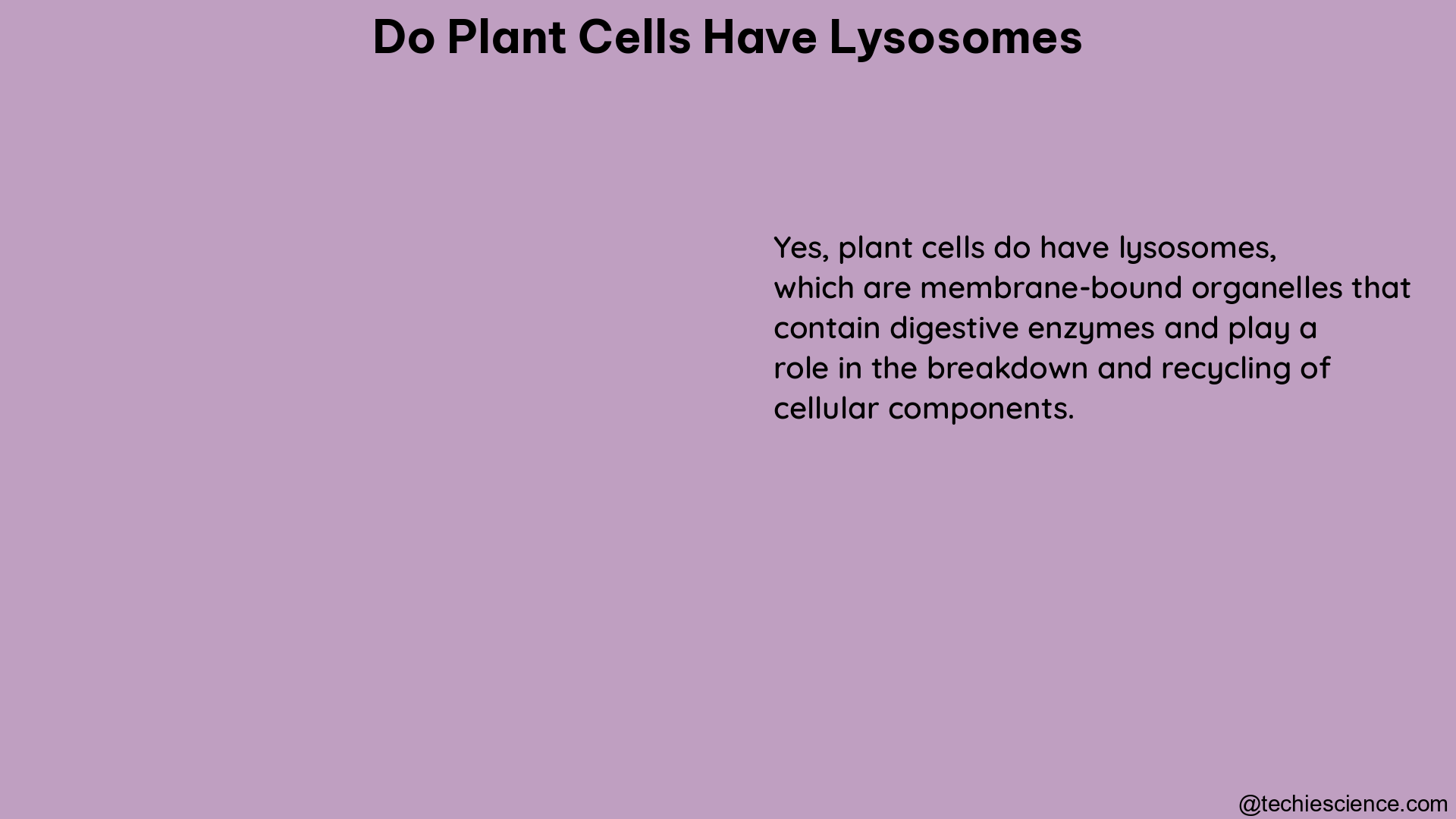The debate surrounding the presence of lysosomes in plant cells has been a topic of interest among biologists for decades. While some sources claim that plant cells do not possess these organelles, others have provided evidence suggesting that certain plant cells do indeed contain lysosomes or lysosome-like structures. This comprehensive guide delves into the intricacies of this ongoing discussion, offering a detailed exploration of the available research and the potential functions of these organelles in the plant kingdom.
Understanding Lysosomes in Animal Cells
Lysosomes are membrane-bound organelles found in the cytoplasm of animal cells, known for their role in the degradation and recycling of cellular components. These organelles contain a variety of hydrolytic enzymes, including proteases, lipases, and nucleases, which work to break down macromolecules such as proteins, lipids, and nucleic acids. Lysosomes play a crucial role in cellular homeostasis, waste management, and the turnover of cellular structures.
The acidic environment within lysosomes, maintained by proton pumps, is essential for the optimal functioning of these hydrolytic enzymes. This low pH environment also helps to protect the rest of the cell from the potentially harmful effects of the degradative enzymes.
Potential Presence of Lysosomes in Plant Cells

While the presence of lysosomes in plant cells has been a subject of debate, several studies have provided evidence suggesting the existence of lysosome-like organelles in certain plant cell types.
Barley Aleurone Cells
One of the most well-documented examples of lysosome-like organelles in plant cells comes from the study of barley aleurone cells. Researchers have found that these cells contain two distinct types of vacuoles: protein storage vacuoles and lysosome-like organelles.
The lysosome-like organelles in barley aleurone cells were found to contain acid phosphatase, an enzyme closely associated with lysosomes in animal cells. The appearance of these organelles coincided with an increase in cellular proteases and protein degradation, suggesting that they function in a manner similar to lysosomes.
Characterization of Lytic Organelles in Barley Aleurone Cells
In another study, researchers used fluorescent probes to further characterize the lytic organelles in barley aleurone cells. They found that these organelles met every criterion of a lysosome, including the presence of hydrolytic enzymes and a low pH environment.
The researchers observed that these lytic organelles were capable of degrading a variety of macromolecules, including proteins, lipids, and nucleic acids. This evidence strongly supports the notion that plant cells, at least in the case of barley aleurone cells, do possess lysosome-like organelles that perform functions analogous to those of animal lysosomes.
Debate and Ongoing Research
While the studies on barley aleurone cells provide compelling evidence for the existence of lysosome-like organelles in plant cells, the debate is not yet settled. Some biologists argue that plant cells do not have true lysosomes, but rather vacuoles that perform similar functions.
Vacuoles in plant cells are known to play a role in the storage and degradation of cellular components, and it is possible that these organelles have evolved to fulfill functions similar to those of animal lysosomes. However, the precise nature of the relationship between plant vacuoles and animal lysosomes remains a topic of ongoing research and discussion.
Potential Functions of Lysosome-like Organelles in Plant Cells
If plant cells do indeed possess lysosome-like organelles, it is important to understand their potential functions within the plant cell. Some of the proposed roles of these organelles include:
-
Cellular Homeostasis and Waste Management: Like their animal counterparts, lysosome-like organelles in plant cells may be involved in the degradation and recycling of cellular components, contributing to the maintenance of cellular homeostasis and the efficient management of cellular waste.
-
Programmed Cell Death: Lysosome-like organelles may play a role in the process of programmed cell death (PCD) in plant cells, which is essential for various developmental and stress-response processes.
-
Pathogen Defense: Some studies have suggested that lysosome-like organelles in plant cells may be involved in the defense against pathogens, as they can potentially degrade and neutralize invading microorganisms.
-
Nutrient Mobilization: During seed germination or other developmental stages, lysosome-like organelles may contribute to the mobilization and breakdown of stored nutrients, making them available for use by the growing plant.
Conclusion
The question of whether plant cells have lysosomes or lysosome-like organelles remains a topic of active research and debate among biologists. While some studies have provided compelling evidence for the existence of these organelles in certain plant cell types, such as barley aleurone cells, the broader applicability of these findings across the plant kingdom is still being investigated.
As our understanding of plant cell biology continues to evolve, further research is needed to clarify the precise nature and functions of these potential lysosome-like organelles in plant cells. This knowledge will not only deepen our appreciation of the complexity and diversity of plant cellular processes but may also have important implications for various areas of plant biology, from development and stress response to biotechnology and agriculture.
References:
- Swanson, S. J., Bethke, P. C., & Jones, R. L. (1998). Barley aleurone cells contain two types of vacuoles: characterization of lytic organelles by use of fluorescent probes. The Plant Cell, 10(5), 685-698.
- Do plant cells have lysosomes? – BYJU’S
- Do Plant Cells have Lysosomes? – BIOLOGY by Miller & Levine
- Do plant cells have lysosomes? – AAT Bioquest
- Do Plant Cells Have Lysosomes? – Smore Science Magazine

Hi, I am Saif Ali. I obtained my Master’s degree in Microbiology and have one year of research experience in water microbiology from National Institute of Hydrology, Roorkee. Antibiotic resistant microorganisms and soil bacteria, particularly PGPR, are my areas of interest and expertise. Currently, I’m focused on developing antibiotic alternatives. I’m always trying to discover new things from my surroundings. My goal is to provide readers with easy-to-understand microbiology articles.
If you have a bug, treat it with caution and avoid using antibiotics to combat SUPERBUGS.
Let’s connect via LinkedIn: